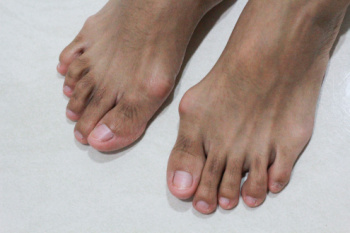Connect With Us
Blog

A bunion is a bony bump that forms on the joint at the base of the big toe, often causing the toe to deviate towards the others. Common issues can include chronic pain, bursitis or inflammation of the fluid-filled pads that cushion the bones, and metatarsalgia or pain and inflammation in the ball of the foot. Severe cases or complications can lead to hammertoes or crossover toes, where toes bend abnormally, and even arthritis in the big toe joint. Preventing bunion complications involves wearing properly fitted shoes with a wide toe box, avoiding high heels, and using orthotic inserts to reduce pressure on the bunion. Maintaining a healthy weight can also alleviate stress on the feet. Treatment options range from non-surgical methods like padding and medications to manage pain to surgical procedures for more severe cases. If you have a bunion that is causing worsening symptoms, it is suggested that you promptly consult a podiatrist who can help to manage symptoms and prevent further complications.
If you are suffering from bunion pain, contact one of our podiatrists of Biebel & DeCotiis Podiatry Associates. Our doctors can provide the care you need to keep you pain-free and on your feet.
What Is a Bunion?
Bunions are painful bony bumps that usually develop on the inside of the foot at the joint of the big toe. As the deformity increases over time, it may become painful to walk and wear shoes. Women are more likely to exacerbate existing bunions since they often wear tight, narrow shoes that shift their toes together. Bunion pain can be relieved by wearing wider shoes with enough room for the toes.
Causes
- Genetics – some people inherit feet that are more prone to bunion development
- Inflammatory Conditions - rheumatoid arthritis and polio may cause bunion development
Symptoms
- Redness and inflammation
- Pain and tenderness
- Callus or corns on the bump
- Restricted motion in the big toe
In order to diagnose your bunion, your podiatrist may ask about your medical history, symptoms, and general health. Your doctor might also order an x-ray to take a closer look at your feet. Nonsurgical treatment options include orthotics, padding, icing, changes in footwear, and medication. If nonsurgical treatments don’t alleviate your bunion pain, surgery may be necessary.
If you have any questions, please feel free to contact one of our offices located in Holmdel and Middletown, NJ . We offer the newest diagnostic and treatment technologies for all your foot care needs.
